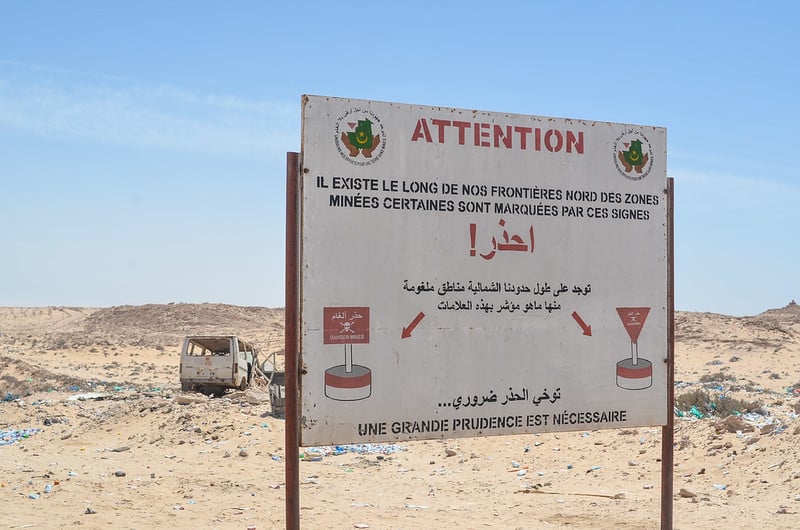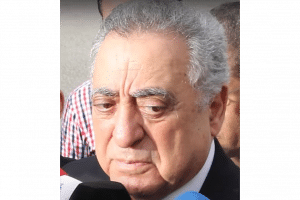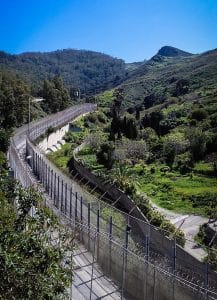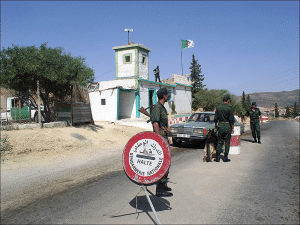A mine warning sign at the Western Sahara and Mauritania border in Guarguarate, 2013 (Flickr)
In an unexpected move, Spain has expressed support for the Moroccan autonomy plan in the Western Sahara. Spain, the former colonizer of the region, maintained neutrality for decades as the conflict between the Sahrawi inhabitants, its Polisario independence movement and Morocco continued. Since Spain left the region in 1975, Morocco sees the region as a part of its territory. Spain’s move points to a wider geopolitical power shift, favoring Morocco’s claims over the territory.
Morocco delighted, Algeria recalls ambassador
Reactions over Spain’s decision varied on both sides of the Mediterranean. Spain’s Foreign Minister Jose Manual Albares called Morocco’s 2007 autonomy proposal the “most serious, realistic and credible basis” to end the conflict. In contrast, its main coalition partner, Podemos commented that they remained committed ‘’to the defense of the Saharawi people and to the resolutions of the United Nations Security Council” – apparently opposing statements made by coalition partner PSOE of Prime Minister Sánchez.
Morocco’s ambassador to Spain, Karima Benyaich, reacted delighted: “a new stage, a new page is opening in the relations between both countries, and it will be an important stage.” Morocco recalled Benyaich last year when a Polisario frontman was treated in a Spanish hospital, sparking a diplomatic crisis.
In reaction to the changing Spanish stance on the Western Sahara, Algeria has now recalled its ambassador. The country has long been an ally of the Polisario independence movement. It called the decision an “abrupt U-turn.”
In a statement, the Polisario reacted in disbelief. “The position expressed by the Spanish government totally contradicts international legitimacy.” They called upon political parties in Spain to “to exert pressure on the Spanish government to correct this grave error”.
Geopolitics
Late 2020, US President Trump recognized Moroccan sovereignty over the Western Sahara. Under the Biden administration, support for the Moroccan autonomy plan was re-iterated earlier this month. The decision for the Trump administration was regarded as a tit-for-tat move, as Moroccan authorities started formal communications with Israeli officials shortly after.
Quickly after the US endorsement, Germany followed its course – earlier France also showed support for Morocco. Morocco has an important role in combating extremism and controlling migration flows towards the EU in Northern Africa. This seems to provide an important incentive to western support for Rabat’s plans in the Western Sahara. Earlier, the Moroccan government also used migration flows to put diplomatic pressure on Spain.
Now, the Spanish government said it wanted to face “common challenges” together with Rabat, “especially cooperation in the management of migratory flows in the Mediterranean and the Atlantic.” By doing so, these countries divert from the UN roadmap for the region, which calls for an independence referendum for the Sahrawi people to decide their future.
Humanitarian situation
Meanwhile, the humanitarian situation in the Western Sahara remains very concerning. 176,000 Sahrawis live in Algerian refugee camps, in the desert, completely reliant on humanitarian help. In the Western Sahara, Moroccan authorities repress the local population, violating international humanitarian law. In February, a hundred civil society organizations called upon Europe to ban trade with illegal settlements such as those in the Western Sahara.
As Morocco seeks to pull the resource-rich Western Sahara into its territory, western states seem to prioritize geopolitical incentives over international agreements made to accommodate the needs of the Sahrawi people in the region. It is imperative that these interests are considered when deciding over the future in the region. It is highly questionable that Spain’s latest move helps in doing so.
Sources: Al Jazeera Africa News I DW Africa News II HRW I HRW II
Photo: Flickr



